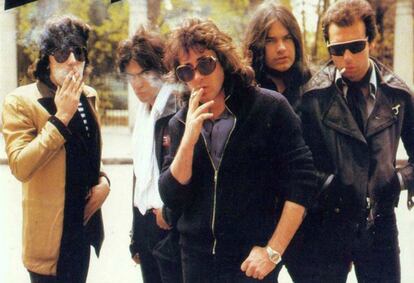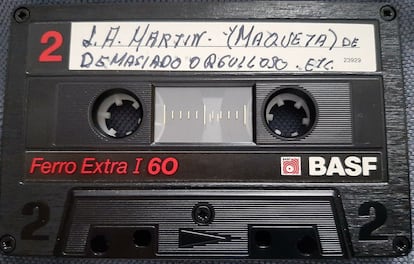If the rich history of Spanish rock needs anything, it is testimonies that fill in the multiple gaps that mark six decades of music, since the bibliography is not abundant. These days an episode that remained in a nebula of conjecture comes to light: the possible existence of a recording by Toño Martín (1954-1991), the original and charismatic singer of Burning. And indeed it exists: the story of this lost and posthumous album was told in detail by this newspaper in mid-August. The album that has been published from what was collected in that legendary demo (home recording) is called bite the bullet (released by Subterfuge Records), and has sold out the first run of vinyl in one week. Now another batch is being manufactured. But since bifurcations always arise from a great story, here is one of the most striking ones. Any fan of Spanish rock and Burning will fall backwards when listening to Martín’s rescued songs: they bear a powerful resemblance to Burning songs that were recorded when the singer was no longer in the group. We talk about classic Burning songs like one night without you (iconic Spanish rock ballad) o This is a robbery. And this is when the question arises: which ones were composed first? Because if those that are revealed now are the originals, it is inevitable to conclude that an injustice has been committed with Toño Martín during the last 40 years. And if so, the most disturbing question arises: why.
Let’s first look at the similarities in some compositions where this pattern is repeated: same music, but different lyrics. Firstly, we play the song from the now discovered album by Toño Martín and secondly the song from Burning that fans have been singing for four decades: Cold pale blue es A night without you fallen angel es Cristina; bad girl es This is a robbery; I don’t have anything es And you won’t know, Too proud to apologize es Don’t stop screaming… Most similar topics are included in Rock and roll nights, the Burning album from 1984, just the first of the group where Toño Martín no longer appears, and are signed and performed by Pepe Risi (guitar and voice) and Johnny Cifuentes (keyboards and voice). When Burning was formed, in the mid-seventies, the two leaders of the Madrid group were Toño Martín (vocals) and Pepe Risi. Between them they composed most of the songs, Spanish rock classics like What is a girl like you doing in a place like this? o Move your hips.
The two had a heroin addiction and died young on the same day (it’s a coincidence: May 9), but in different years: Martín in 1991, aged 37, and Risi in 1997, aged 41. Follow the thread of the story. The history of this fundamental band of Spanish rock is not at all simple. We are talking about the late seventies, of a precarious Spanish music industry, of an attitude of survival, of a distribution of dividends without stenographers, of some young people who lived from day to day and some slaves to hard drugs. Without Martín and Risi to testify, there are still musicians who experienced it first-hand to face the labyrinthine mission of knowing who really composed those classics.
The most obvious witness is Johnny Cifuentes, who lived through the losses of Martín and Risi and still continues to lead the group today. This newspaper has contacted him and the musician has not wanted to speak. Another of the musicians who formed Burning in the eighties was bassist Manuel Fernández. We located him in Galicia, stuck in a studio he has in his house and playing a keyboard. “A musician always has to be studying, even if he’s almost 70,” he says on the phone, laughing. “I was the bassist on that demo (what is now the album “Bite the bullet)”, Fernández states forcefully. And he gives details: “At the end of the Burning rehearsals we dedicated it to playing some new songs that we were preparing for the next album. Paco Palacios was our engineer, and later guitarist, and he was a fan of recording devices. So I always recorded. The songs of bite the bullet They belong to one of those rehearsals in our premises in Madrid, songs where Toño (Martín) and Pepe (Risi) composed most of them and we retouched them together in the premises.”.
According to Fernández’s testimony, the first conclusion is drawn here: they were songs aimed at Burning’s fifth album, with Martín as singer and “composed and recorded before the album Rock and roll nights.” But weeks after that rehearsal the band broke up. In recent years, Johnny Cifuentes has recounted the circumstances: his confrontation with Toño Martín and the latter’s intention to ride, according to his version that can be heard in the Pioneers podcast (RNE), “Burning in Bilbao”. “Toño said: ‘Pepe (Risi), you’re coming with me to Bilbao, right?’ Pepe replied: ‘I have to think about it.’ I don’t know if Pepe later regretted not having left, the fact is that he decided to stay with me and continue the story. After that discussion, I went to the Commercial Registry and registered the name ‘Burning’, which no one had, in my name, Juan Antonio Cifuentes (Johnny).” Thus, Johnny and Pepe stayed as Burning and recorded Rock and roll nights1984), where they signed all the songs. Not a mention of Toño Martín.
Fernández, Burning’s former bassist, points out today: “Neither Toño nor I wanted to leave Burning. We gave it a while, but Johnny registered the name and by that time we were out of Burning. It was a coup d’état. Toño suffered a lot, because he was the biggest loser. He was the soul of Burning. He put on his face, his voice. And feeling left out of your history for years had to be a very big blow.” And he adds: “Think about something that is pure logic: two people who are hooked (he and Toño) and have a source of income like Burning don’t leave it. We had a few performances a month that they gave us to pay for what we needed. We didn’t want to cut off that source of income. “That’s a joke.”
Eduardo Pinilla has been Burning’s guitarist from 1992 to 2019. During that time he shared the stage with Johnny Cifuentes and also with Pepe Risi, until he died in 1997. “I had been playing those songs for almost 30 years and I had no idea that there was a model with those themes. It seems clear that Toño had created those songs with Pepe to record them with Burning, but Johnny registered the name on his own and they stayed there. It is a bit unpleasant to see now that those songs were largely Toño’s. If this was so, two new unknowns arise: why Toño did not denounce him and why Risi, a close friend of the singer, did not accredit the person he called “his brother.” “We talked about a few months after Risi decided not to go to Bilbao with Toño. What I sense is that at that moment they were estranged,” says Ricardo Moyano, professional judge and author of the lengthy book Burning. Veneno del rock. Toño Martín’s daughter, Penélope, provides more information: “In 1984 there was a Burning concert in Briviesca (municipality of Burgos where Martín went to live with his partner, Esther, and his daughter Penélope). At one point, Pepe calls from the stage to my father (who was no longer in the group), who had gone to the venue with my mother: ‘Toño, go up on stage and sing. This is your group.’ But my father goes home, disappointed. He already knows that another album has been put together with the skeleton of his songs. And he doesn’t want to participate in that farce. Pepe later regretted it. “He wrote letters to my father asking for forgiveness, and they resumed their friendship.” The times of estrangement and subsequent reconciliation between Risi and Martín can be followed in two songs that Risi recorded with Burning: And you won’t know (1984), where he blames his colleague: “What’s wrong, my friend, I don’t see you anymore. / It won’t be that one day you stopped growing. / Think that one day you were quite important”; and the surrendered and conciliatory I love you so much (1993), where Risi breaks down singing: “If I look at you, you smile and wait for me without pain. / In eternity I will find you. / And wherever you are I will smile. / I love you so much…” Toño had already died when Risi wrote it.

Another biographer of the group, Alfred Crespo, author of Burning. Madrid and co-director of the magazine Ruta 66, tells his version by phone: “The absence of data in the credits of bite the bullet adds more fuel to the fire of confusion on this issue. What musician contributes to each song? Were they compositions that had the active participation of Martín? If so, why didn’t you claim authorship? Furthermore, anyone familiar with his career and his sound can perfectly distinguish Johnny’s peculiar way of playing on that demo. If he was present at the sessions, the most logical thing is to seriously consider that the recordings now published arise from band rehearsals. And it is evident that the vocal parts were added later, with lyrics radically removed from the accurate prose shown by Toño in his first three albums. Whoever has the information necessary to clear up unknowns should speak now. Or remain silent forever, which is another option…”
At the end of this complicated story remains what truly matters, the beautiful songs, whatever they are called. one night without you o Cold, pale blue.

